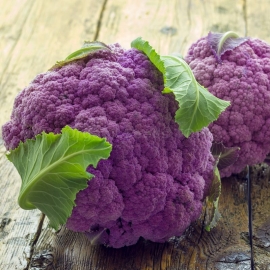


«Di Sicilia Violetto» - Organic Cauliflower Seeds
1.14 €
Packed with rich nutrients, cauliflower or cabbage flower is one of the commonly used flower-vegetable. The flower heads contain numerous health benefiting phtyo-nutrients such as indole-3-carbinol, sulforaphane etc.
-
Organic Cauliflower «Di Sicilia Violetto»
Packed with rich nutrients, cauliflower or cabbage flower is one of the commonly used flower-vegetable. The flower heads contain numerous health benefiting phtyo-nutrients such as indole-3-carbinol, sulforaphane etc., that help prevent prostate, ovarian and cervical cancers.Sow
Sow thinly, 2cm (¾in) deep in a seedbed. Final rows should be 15cm (6in) apart for mini caulis or around 60cm (24in) for larger cultivars. Thin the seedlings to a final spacing of 15cm (6in) apart for mini caulis or 60cm (24in) for larger cultivars. However, best results come from sowing in cell trays using any good multi-purpose potting compost. As cauliflowers mature in a rush, avoid raising too many plants at a time.
The main sowing period is March to May, although early crops can be achieved by sowing under glass in January/February or sowing cultivars in the autumn in a glasshouse or coldframe.
Grow
Cauliflowers do best in very fertile soil, and digging in a bucketful of well-rotted manure or organic matter before planting, and raking in 150g per sq m (5oz per sq yd) of Growmore or other general purpose fertiliser, will help growth. Firm the soil by treading before planting.
If growth is checked, at any time during growth, they produce small, deformed heads. To avoid problems, water plants well the day before transplanting and make a hole deep enough to hold the plant with the lowest leaves at ground level. Fill this hole repeatedly with water. This will fill the hole with soil and ensure the plant is sitting in a large area of moist soil. Firm the soil very well against the roots.
Space summer and autumn cropping types 60cm (2ft) apart and winter cultivars around 75cm (2.5ft) apart; spacing of 30-45cm (12-18in) apart, provides mini, 'one person' curds. Water well in dry weather, watering every 10 days, and apply sufficient water to thoroughly wet the root zone. Once the plants are growing well, add 30g (1oz) per square metre of high nitrogen fertiliser such as sulphate of ammonia to boost growth and curd formation.
Harvesting
Start cutting when the heads are firm; once the florets start to separate, it is too late.
